- Home
- Lou Cameron
File on a Missing Redhead Page 3
File on a Missing Redhead Read online
Page 3
I nodded. “Until we get a report on another missing redhead.” I took the slave bracelet out of my pocket and placed it on the green desk blotter between us. Roberta Grey picked it up and sighed, “That’s Kathy’s. You say you found it on the body?”
“Under it,” I corrected. “You’ll notice the clasp is broken. Looks like it was repaired once with silver solder, and popped off when her legs started to… ah…”
“Bloat,” finished Roberta Grey in a too tough voice.
She sat there for a time, staring at the tiny bauble in her rather grubby fat fingers. Then she handed it back to me and muttered, “Well, there goes an idea I was working on in my suspicious little mind.”
“What idea was that, Mrs. Grey?”
“It’s nothing,” she said. “Just something that reminded me of another girl I knew, a long time ago. You have any idea who killed her, Lieutenant?”
“Hazel—Miss Collier—said something about there being some guy she’d been dating,” I replied. “I was hoping you could give me a lead on him.”
“Hunches any good?”
“A hunch is more than I’ve got.”
Roberta Grey nodded and pushed a button on her intercom. A voice I recognized as Hazel’s answered, and Mrs. Grey said, “Would you bring Kathy’s active file in here, honey? Kathy was hot as a two-dollar pistol, Lieutenant,” Roberta Grey explained as we waited. “Just about the best skip tracer I’ve ever had. I mean if Kathy couldn’t nail a deadbeat’s feet to a stump and push him over backwards, I don’t know who in hell could!”
“You’re pretty good,” I corrected, with a grin.
She looked puzzled and then she grinned back at me and said, “You heard that little seduction scene just now? Hell, that was bush-league stuff, Lieutenant. Guy named Charley Webber bought a sports car on time and doesn’t want to pay for it or give it back. Been ducking a repossess for a couple of months.”
“But he’s got a date with a swinger in a lavender sweater and a miniskirt.” I laughed. “And it looks like he’ll have to walk home from the Dunes alone.”
“Stupid jerk.” She shrugged. “He knows we’re out to repossess his car and he makes a date with a totally strange broad who calls him at work with some cockamammie story about being a friend of Blanche.”
“I’ll bite,” I said. “Who’s Blanche?”
“Beats the crap out of me!” Roberta Grey smiled. “I figured the guy for a skirt chaser when I read the credit report. Single, employed, and driving a red T-bird. Took a chance on him knowing at least one Blanche well enough for her to have told a girl friend how great he was.”
“With that voice,” I added, “I imagine you could have told him Lucrezia Borgia sent you.”
“You like that, huh?” she purred, dropping into the sultry act. I laughed, a bit uncomfortably. She was at least fifty and built like a toad. But that voice was something on the glands!
The door opened and Hazel came in. She looked a little surprised to see me. But she kept her cool as she dropped a manila folder on Roberta Grey’s desk with a little nod that might have included either of us.
Mrs. Grey waited until she’d excused herself before she shot me a sudden look and gasped, “You’re the cop!”
“Beg pardon?” I blinked.
“The cop that arrested Stretch Voss,” Roberta Grey insisted.
I stared unblinking at her for a time and then I nodded and said, “So?”
“So congratulations,” sighed Mrs. Grey. “Everybody in town knew Stretch was robbing the customers as well as the management of that club he ran on the Strip.”
“Everybody but Hazel.” I shrugged. “We were talking about Kathy Gorm, Mrs. Grey.”
“You can call me Roberta.” She smiled. “No man who sends a creep like Stretch Voss to Carson City can be all bad. The reason I wanted you to look at these papers, Lieutenant, is because I’ve a hunch they have something to do with the way Kathy dropped out of sight.”
“You mean one of the skips she was tracing might have played rough?”
“Or something,” Roberta replied cryptically. “You know enough about how we operate to know that very few skips ever know we’re after them, let alone who we are.”
I took the manila envelope she handed me and started going through the mimeographed form sheets. Each case, I noted, was kept on a separate sheet. Many of them had additional notes paper-clipped to them. They varied in content from nearly empty forms with most of the spaces blank to remarkably complete rundowns on ladies and gentlemen who’d run out on their creditors.
“Some of these people owe pretty large sums of money,” I commented, leafing through the missing girl’s notes.
“Three thousand, on an average. We don’t bother with small stuff here in Vegas. People whip in and out of here like Gypsies, and it’s just not worth it to us to try and find anyone who owes a couple of hundred bucks.”
“You work on a percentage, or what?” I asked, looking for a name, any name, that might jog my computer.
“Mostly we work on a straight finder’s fee. We locate them, verify them, and let the client worry about collecting.”
“I heard that collection agencies buy up bad debts for a few cents on the dollar and make their profit on whatever they can collect.”
“You heard wrong, if you’re talking about this agency.” The stout skip tracer sniffed. “Shyster lawyers do that, sometimes, and hire us to locate for them. But it’s not a profitable operation in a transient town like this.”
Before she could explain further, I interrupted her to ask, “Can I use your phone?”
She nodded. “Dial nine for an outside line. Find anything interesting?”
“Found a name that rings a bell.” I picked up the phone on her desk and dialed the office and got Bert Crawford on the horn. I said, “We’d better put out an APB on Duncan MacDonald, Bert. Make it that we want to question him about that stolen Volkswagen, for now.”
“I thought he was clear on that DOA, Frank,” protested Crawford mildly.
“I thought so, too,” I replied, “but his name just turned up on a list Kathy Gorm was checking out when she dropped from sight.”
Bert let out a low whistle and asked, “Got anything on him besides a name, Frank?”
“Got everything but how often he washes his socks.” I grinned. “You taking this down, Bert?”
“Keep talking.”
I scanned the sheet Kathy Gorm had filled out on Duncan MacDonald in her crabbed, rather childish handwriting. Then I said, “He’s single, works as a sign painter—when he feels like it. Most of the time he seems to shop for clothes, color TV sets, and cars, on credit. He’s run up tabs totaling well over ten grand in and around Las Vegas within the past six months.”
“Gambling debts included?” asked Bert. “The guy at the motel said something about him being a compulsive gambler.”
I looked over the dossier and frowned. “Negative. Nothing in here about owing any of the houses money. But they don’t give markers that easy in any case.”
I glanced at Roberta Grey and raised an eyebrow. She nodded and muttered, “None of the casinos will trust you farther than they can throw you.”
“Here’s a description,” I went on. “MacDonald’s a short, wiry guy with light brown hair. Wears glasses and wears sloppy clothes. Often comes home in paint-flecked jeans. Sign painter, remember?”
Then I frowned thoughtfully and muttered, “What the hell?”
“Something wrong?” asked Roberta Grey, shooting me an odd look I couldn’t read.
I said, “According to this, MacDonald’s a sloppy dresser. Yet one of the creditors he’s into for a large hunk of cash is Maurice of Hollywood. Isn’t that a poshy haberdashery on Vegas Boulevard?”
“Poshy is the word,” agreed Roberta Grey. “Turtleneck sweaters with French cuffs and clutzy rhinestoned smoking jackets you couldn’t get Liberace to wear at the point of a gun.”
“Yet according to what Kathy Gorm had on him, h
e’s supposed to be a slob.”
“Yeah,” nodded Roberta. “Makes you wonder, doesn’t it?”
“If the stuff he bought was expensive,” suggested Bert at the other end of the line, “he might have been buying stuff on time to sell. Harris said he had an expensive roulette habit, Frank.”
“Clothes?” I frowned. “Maybe. But it would make more sense for him to pick up stuff like watches and cameras.”
Before anyone could think of an answer to that, I’d read on and sighed, “Oh crap!”
“Problems?” asked Bert.
“The guy’s a Canadian.” I sighed again. “That means we’ll have to play it straight on the APB. Canada will extradite one of her own for murder, but not much else.”
“So we charge him with murder,” Bert replied.
I thought about that, staring at the papers in my hand as I mulled over what we really had on one Duncan MacDonald. We didn’t have much. He’d once owned the Volkswagen the Gorm girl’s body had turned up in. But if Harris was right, he’d left for Elko before she’d vanished.
“Call the Elko office,” I said, “and ask them to check out the local sign painting shops.”
“They won’t find him,” cut in Roberta Grey.
“You’ve been on the horn to Elko?” I frowned at her.
“I’ve been on the horn to every sign shop in the state!” she replied. “MacDonald’s not working in any of them. And there aren’t any new painters, using any name, that fit that description.”
“Oh… kay,” I muttered. “Let’s see what Motor Vehicle has on him, Bert. According to this credit file, he didn’t intend to come back for the Volkswagen he left with Harris for security. He made a down payment, two months ago, on a sixty-eight T-bird. Bottle green, with dealer’s plates. He ought to have been to Motor Vehicle for his own plates by now. Maybe they’ll have a recent address.”
“They won’t,” said Roberta Grey. “I’ve already talked to them.”
“You called Motor Vehicle?” I asked.
“Let’s say the sultry secretary of a certain police official called Motor Vehicle.” She smiled. “They have an address on the application MacDonald put in for plates, all right.”
“But it’s a phony?”
“It’s an empty lot on College Avenue. They did give me the number of his new plates, though.”
She wrote a number on a slip of note paper and handed it across her desk to me. I noticed she hadn’t checked and I made a mental note that Roberta Grey was one of those people with a photographic memory. She’d have made one hell of a cop.
“We’ll make that an APB on the car, Bert,” I said. I read off its make, model, description, block and plate numbers, and added, “Have them pick the driver up on suspicion of grand larceny. The car’s a couple of payments overdue and he ought to be feeling a little guilty about it. The idea is to question him about all the dough he owes and then spring the weenie on him when he least expects it.”
“I’ve questioned a few suspects, Frank,” Bert Crawford replied in a defensive tone. “Grand Larceny it is. You want to notify the FBI?”
“Better,” I said. “They’ll be able to grab him if he’s left the state. J. Edgar’s boys might even get Canada to give him back on a hot car rap without having to tip him off to the fact that he’s wanted for questioning in a homicide.”
“Before you hang up,” Roberta Grey warned, “wouldn’t you like a description of Duncan MacDonald?”
“Description?” I blinked. “I just gave his description!”
“You gave the description in Kathy’s file,” she corrected.
“It’s inaccurate?”
“I’d say so,” she replied dryly. She picked up another of the papers littering her desk and read, “Duncan J. MacDonald, male Caucasoid; age, thirty-six; height, six foot two; weight, about one seventy-five; hair, black and curly; eyes, pale blue; occupation, lead burner; citizenship, U.S.”
“I don’t get it.” I frowned. “That doesn’t sound anything like the guy on this credit file.”
“Makes you wonder, doesn’t it?” Mrs. Grey sighed. “I tried to raise my Kathy right, but you can’t win ’em all.”
“Where’d you get your description of the guy?” I asked.
“Same place Kathy did,” replied Roberta Grey, “the license bureau. Can’t drive a car without a license, you know. Not even a car you haven’t paid for.”
I let some of that go for now and phoned the new description in to Crawford. As soon as he had it all down I hung up and took another tack in my interview. I decided it was time I got a bit subtle with Roberta Grey. I lit a cigarette, blew some smoke at her, and said, “Give.”
“Give what?” she answered, a trifle coy for a woman her age.
“You’re holding out on me, Roberta. You know something you’ve been saving for a rainy day. So pitter patter. Let’s hear it.”
“Like I said,” she murmured uncomfortably, “it’s only a hunch, and I wouldn’t want to accuse Kathy of anything now that she’s not here to defend herself.”
“Accuse away,” I insisted. “Kathy Gorm can hardly give a damn what we think of her now. But you might be helping her killer get away by sitting on information.”
“I know,” agreed Roberta Grey, “so first I’m going to tell you a story. A story about a girl. You might say it was a love story. Then again you might say it was a comedy. It all depends on your point of view.”
“Who was this girl, Roberta?” I asked. “Anyone we know?”
“Just a girl-type girl,” she answered. “Maybe not as pretty as some girls. Hell, maybe not as pretty as most girls. Anyway, it happened a long time ago, back East.”
“We’re not talking about Kathy Gorm,” I said. It was not a question. I was just checking.
“We are talking,” said Roberta Grey firmly, “about a poor chubby little broad who worked as a skip tracer in a place called Baltimore. A girl who ate too much chocolate, read sex novels, and masturbated more than was good for her.”
“I think I get the picture.”
“Okay.” She nodded, not looking at me as she continued. “This girl we’re talking about was checking out a deadbeat. A good-looking guy who’d busted up with his wife, he said, and owed everybody in Baltimore a bundle of bread. The girl called him maybe a dozen times, and the more she checked on the guy the more sorry she felt for him. She was pretty young, you see.”
“Can’t afford to feel sorry for anyone in your line of work, eh?” I said sardonically.
“Look,” Roberta Grey snapped, “somebody’s gotta take away the garbage, somebody’s gotta bury the dead, somebody’s gotta keep businessmen who extend credit from going broke!”
“You’re important to the economy,” I soothed.
“You trying to be funny?” She sniffed. “Okay, so lots of people think we’re heels. Maybe lots of people get in financial messes through no fault of their own and we’ve got to squeeze them anyway. You’re a cop, Lieutenant. You must have had times when you didn’t want to make a pinch but knew you had to.”
I winced. “Yeah, I know what you mean. So what about this girl we were talking about? The one in Baltimore who felt sorry for this guy with all the unpaid bills?”
“They weren’t his fault,” she said. “His wife had had a drinking problem and before she ran off with another man, she’d run up bills all over Baltimore.”
“So he skipped?”
“He tried to. But this girl we’re talking about, she was pretty good. He lost his job after his creditors slapped an attachment on his salary. So he cut out. Moved to another neighborhood and got another job. She nailed him within three months.”
“And sicked the wolves on him?”
“Located him. For a fee. The wolves do their own sicking.”
“Makes it kind of rough for a guy to start over again, doesn’t it?”
“That’s what… this girl we’re talking about thought. She was young. She didn’t know too much about bankruptcy laws, and the
guy was a smooth talker.”
“She talked to him?”
“Of course. How do you suppose a telephone skip tracer operates? He didn’t know he was talking to the same girl at first. She had lots of voices and used all sorts of excuses to call him. He’d gotten cagey and she had to be careful about her verifications.”
“Verifications?”
“Before you report a skip to a client, you have to make sure—damned sure—that you’ve got the right party. Start harassing the wrong people and they can sue hell out of you. Some of the methods bill collectors use are slightly illegal, and people get uffish as hell about them if they don’t owe you a bean.”
“I understand. So what happened to this guy in Baltimore?”
“He moved to Annapolis. A jerk lawyer slapped a summons on him right where he worked and the guy skipped again. It took this girl we’re talking about another six weeks to relocate him.”
“In Annapolis?”
“Baltimore. He’d moved to Annapolis and made a big thing of opening a checking account under his right name. Had public utilities switched from his last known Baltimore address and put an ad in a local paper applying for a job. Then he hopped a Greyhound back to Baltimore and moved into a rooming house a few blocks from where he used to live. It’s an old trick.”
I nodded. “We run into it all the time. No new faces in the neighborhood for the local merchants and prowl-car men to report. The locals seldom know neighborhood people by name, but they’ll report a suspect as ‘all right, lived around here for years,’ if anybody asks about them.”
“Yeah.” She sighed. “But this girl we’re talking about knew that trick. She knew lots of tricks. Didn’t know beans about anything else. But she was one hell of a skip tracer. She knew the guy was likely to take up the same line of work. So she started calling around town, asking to talk to the ‘new man in the machine shop.’ You see, he could change his name without much trouble, but she figured he’d be using the same Social Security number. She nailed his job down three weeks after he’d moved back to Baltimore.”
“I’d have thought,” I cut in, “the guy would have had sense enough to change his Social Security number. All it takes is a few minutes at the local office.”

 Renegade 32
Renegade 32 Renegade 31
Renegade 31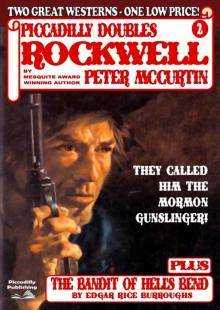 Piccadilly Doubles 2
Piccadilly Doubles 2 Renegade 35
Renegade 35 Stringer and the Hangman's Rodeo
Stringer and the Hangman's Rodeo Renegade 28
Renegade 28 Renegade 23
Renegade 23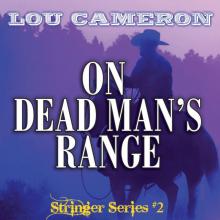 On Dead Man's Range
On Dead Man's Range Citadel of Death (A Captain Gringo Western Book 11)
Citadel of Death (A Captain Gringo Western Book 11) Renegade 33
Renegade 33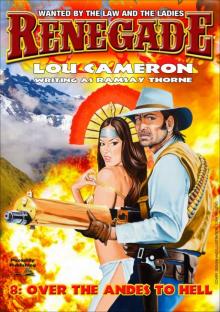 Over the Andes to Hell (A Captain Gringo Western Book 8)
Over the Andes to Hell (A Captain Gringo Western Book 8) Renegade 30
Renegade 30 Renegade 36
Renegade 36 Stringer in a Texas Shoot-Out
Stringer in a Texas Shoot-Out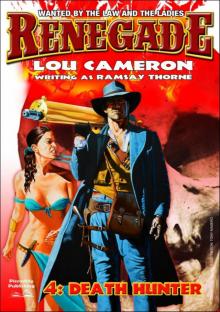 The Death Hunter
The Death Hunter Stringer and the Wild Bunch
Stringer and the Wild Bunch Renegade 29
Renegade 29 Renegade 21
Renegade 21 Stringer in Tombstone
Stringer in Tombstone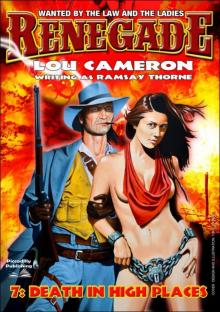 Death in High Places (A Renegade Western Book 7)
Death in High Places (A Renegade Western Book 7)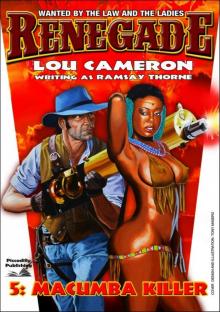 Macumba Killer
Macumba Killer Renegade 17
Renegade 17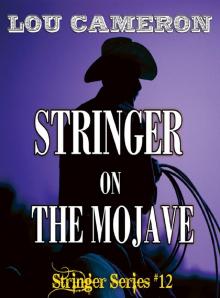 Stringer on the Mojave
Stringer on the Mojave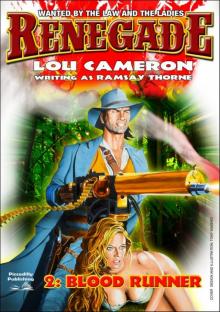 Blood Runner
Blood Runner Renegade 22
Renegade 22 Stringer and the Hanging Judge
Stringer and the Hanging Judge Stringer and the Hell-Bound Herd
Stringer and the Hell-Bound Herd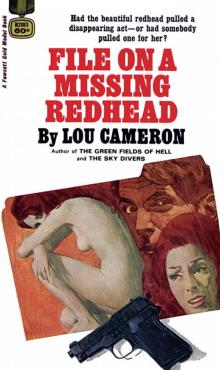 File on a Missing Redhead
File on a Missing Redhead Stringer on the Assassins' Trail
Stringer on the Assassins' Trail Mexican Marauder (A Captain Gringo Adventure #16)
Mexican Marauder (A Captain Gringo Adventure #16) Stringer
Stringer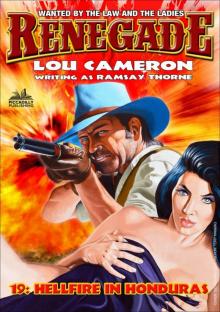 Renegade 19
Renegade 19 Stringer and the Oil Well Indians
Stringer and the Oil Well Indians Stringer and the Lost Tribe
Stringer and the Lost Tribe Piccadilly Doubles 1
Piccadilly Doubles 1 Stringer and the Border War
Stringer and the Border War Renegade
Renegade The Badlands Brigade (A Captain Gringo Adventure Book 12)
The Badlands Brigade (A Captain Gringo Adventure Book 12) Stringer and the Deadly Flood
Stringer and the Deadly Flood Renegade 25
Renegade 25 The Great Game (A Captain Gringo Western Book 10)
The Great Game (A Captain Gringo Western Book 10) Stringer on Pikes Peak
Stringer on Pikes Peak